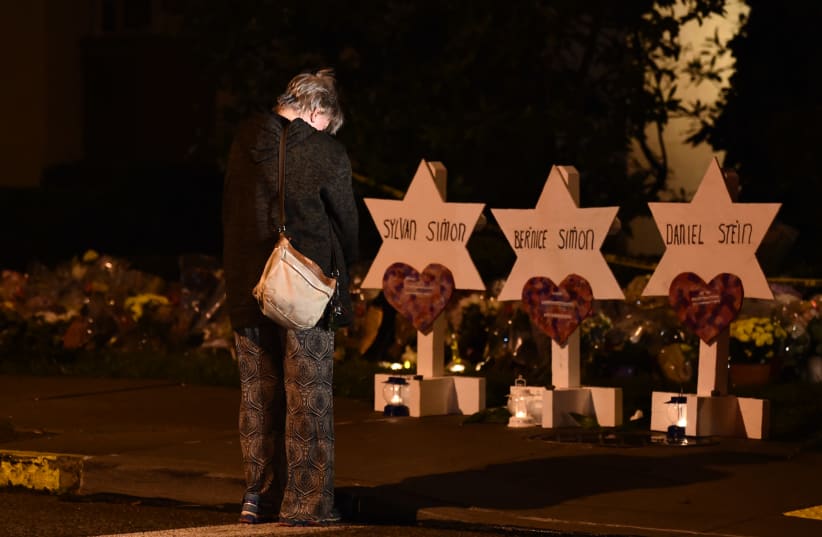Most of the caps perched atop those heads Sunday morning were satiny blue with silver lettering: “Together we stand,” in English, above the Hebrew rendering of “shalom,” or “peace.”The gesture was intended as a show of solidarity with the area’s Jewish community in the wake of last month’s fatal mass shooting at a Pittsburgh synagogue. The Oct. 27 attack left seven people injured and 11 dead, ranging in age from 54 to 97.“The fact that you’re wearing those blue yarmulkes, as so many people are here today, makes me so happy,” Kaplan told the youngsters.“It shows that we’re all in this together,” Kaplan added. “All that matters is that we’re all God’s children.”Pulpit exchangesKaplan, who leads the Temple Israel congregation nearby, teamed up with Zanicky for the commemoration, in which roughly 600 yarmulkes, also called kippahs, were distributed to 12 area churches, Zanicky explained.“This is us saying to our Jewish neighbors: ‘We support you. We are totally against anti-Semitism. We’re with you,’” Zanicky said.The day after the shootings, as he was preparing for his Sunday sermon, Zanicky was sitting in his office when his eyes fell upon a yarmulke on his desk, previously given to him by Kaplan.He wore it up to the pulpit that day, as he was talking about the shootings with his congregation.The standing-room-only crowd who turned out for the following day’s community vigil at the Jewish Community Center convinced Zanicky that there was a need for more dialogue, and healing.As it turns out, he and Kaplan already had a “pulpit exchange” scheduled for this past weekend, with Zanicky scheduled to speak at Temple Israel on Saturday and Kaplan scheduled to speak at First Presbyterian on past Sunday.Together, he and Kaplan arranged to have the special yarmulkes made in time for the scheduled pulpit exchange. Temple Israel had them printed.“We have a long history of pulpit exchanges with Temple Israel,” Zanicky said. “This was already planned. The circumstances just made it more poignant.”During his Saturday remarks at Temple Israel, Zanicky said he discussed “how much we as a civilization owe to Judaism historically.”“A third to half of the world, its ethos has pretty much been formed by ancient Judaism,” Zanicky said, referring to the common roots of the Jewish, Christian and Islamic faiths.“Whether they understand it or not is another issue,” he added thoughtfully.Kaplan’s addressIn his Sunday address at First Presbyterian, Kaplan first spoke with the children about the significance of the yarmulke — which, he said, “reminds us that there is always someone above us, there’s always someone watching over us.”To the adults in the room, Kaplan’s remarks mixed gratitude as well as frankness about the world’s long history of antisemitism.“I wish I could explain to you in simple terms why so many people on Earth hate Jews and Israel,” Kaplan said.“A glaringly simple answer may be the Torah itself,” he said, referring to the first five books of the Hebrew Bible, which Christians call the Old Testament.According to the faith, the books were revealed by God to the prophet Moses. As Kaplan explained it, promoting teachings that placed the rule of God over earthly kings and princes has never endeared Jewish people to the world.Considering more recent times, Kaplan acknowledged that the creation of the state of Israel in 1948 — including its successes as well as treatment of its Palestinian minority — have combined to foster envy as well as resentment toward Jews around the world.“Believe me when I tell you, Israel isn’t heaven on earth,” Kaplan said.But, he said, Jewish people around the world have made many positive contributions to humanity, including scientific and medical advances, despite thousands of years of opposition.“I can’t tell you why so many people hate Jews. I can tell you that being hated has never stopped us from trying to make the world a better place,” Kaplan said.———©2018 The Times Leader (Wilkes-Barre, Pa.). Distributed by Tribune Content Agency, LLC.Members of the First Presbyterian Church in Wilkes-Barre and other churches in the area are wearing blue yarmulkes at services today to show solidarity with the Jewish Community #TogetherWeStand #Shalom pic.twitter.com/ZpuWpn0od3
— Chelsea Strub (@chelseastrub) November 18, 2018
Pennsylvania churchgoers don kippot in solidarity after Pittsburgh synagogue shooting
Most of the kippot were blue with silver lettering: “Together we stand,” in English, above the Hebrew rendering of “shalom,” or “peace.”
